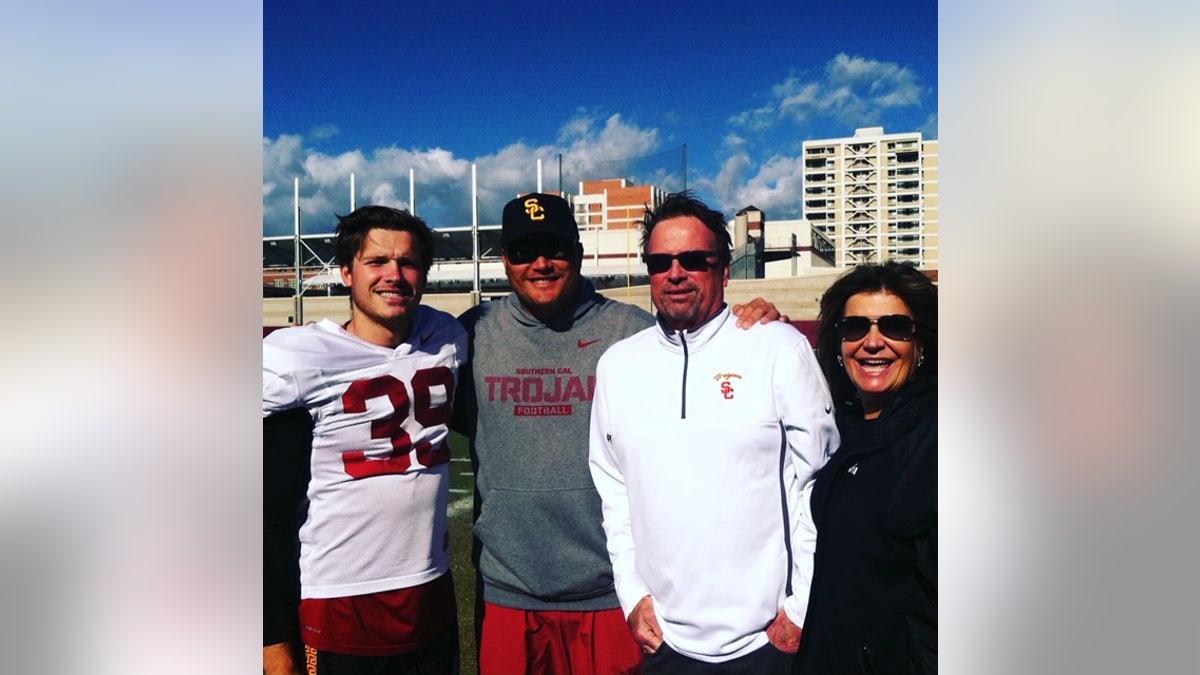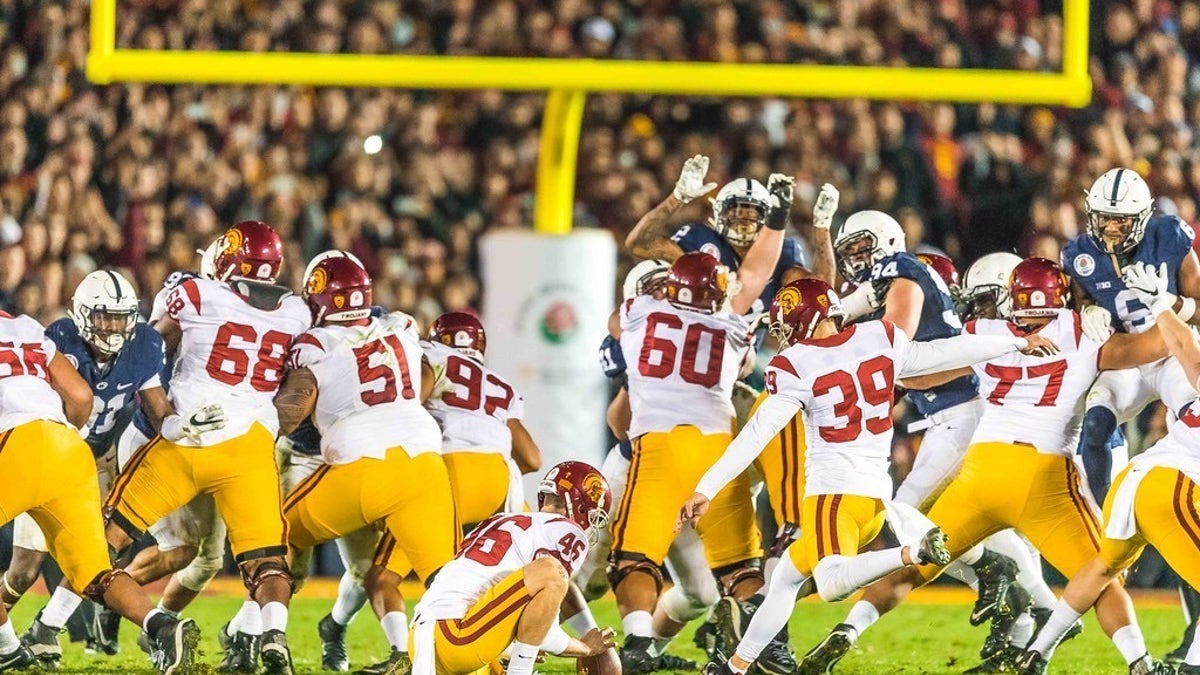For more than three years, expelled University of Southern California (USC) football player Matt Boermeester – embroiled in a Title IX assault accusation case – has been fighting the state legal system just for the chance to have his side heard on a federal level.
Despite a small and rare legal victory, the one-time National Football League (NFL) hopeful says he has a long way to go in his quest for due process in a life derailed by what he deems an unjust "male bias witch hunt."
"The truth is important because the consequences for me have been so devastating. The truth is all I am seeking here," Boermeester told Fox News this week. "You don't realize, you are a kid at the time, that USC is trying to protect itself and its hundreds of millions of Title IX funding, not you as the student."
Late last month, the California Court of Appeal reversed the trial court decision and overturned Boermeester's January 2017 expulsion, ruling that his Title IX proceeding was "unfair."
This paves the way for Boermeester, now 26, to forge ahead with a seven-count federal lawsuit against the prominent university on the grounds of "breach of contract, infliction of emotional distress, negligence and selective enforcement of Title IX," the federal legislation that outlaws gender-based discrimination in the education system and obliges institutions to pursue investigations around sexual misconduct.

Late last month, the California Court of Appeal reversed the trial court decision and overturned Boermeester’s January, 2017 expulsion, ruling that his Title IX proceeding was “unfair.” This paves the way for Boermeester, now 26, to forge ahead with a seven-count federal lawsuit against the prominent university on the grounds of “breach of contract, infliction of emotional distress, negligence and selective enforcement of Title IX,” the federal legislation that outlaws gender-based discrimination in the education system and obliges institutions to pursue investigations around sexual misconduct. (Matt Boermeester (provided))
Andrew Miltenberg, an attorney for Boermeester, said it "is clear that USC used a flawed investigation method which included denying Matt the opportunity of real-time cross-examination of witnesses."
"The next step is to push forward with the federal lawsuit, which has been filed, but we had to put it on hold while the California State Court gave us the right to move forward, which it just did. That suit will go into a discovery which will allow us to depose various witnesses and get to see what was in their (USC) records, which will help us prove this was unfounded, and expose the larger biases in the system," he continued. "There is a long way to go; we have fought for four years just to get this far. The ruling was an important beginning, but it is not the end."
Boermeester, then 22, was a member of the USC football team, who kicked the game-winning field goal for USC at the 2017 Rose Bowl.
But just days after the victory, and his first night off crutches after a post-season surgery, Boermeester's life unraveled.
BRIAN BANKS BIOPIC PUTS SPOTLIGHT ON FALSE RAPE ALLEGATIONS AND THE LIVES IT DESTROYS
According to court documents, in the early hours of Jan. 21, 2017, two USC students heard some commotion and allegedly observed – from a window – Boermeester put his hand on his then-girlfriend Zoe Katz's neck and push her against a wall near her apartment. One of the students reported this incident to the USC men's tennis coach – their father – which sparked an investigation, as required by law.
Five days later, Boermeester was charged with "intimate partner violence" – despite the fact that the alleged victim stated on multiple occasions that such conduct never occurred. The honors student was handed a letter informing him of the charges and immediately escorted off campus, ejected with just two classes to go before graduation, suddenly slapped with F's for other subjects, dropped from the football team, and instantly deemed persona non grata.
"I wasn't allowed to go to class, I wasn't allowed to talk to my coaches or teammates, and my eligibility to play had expired. I was completely cut off from everything," he said. "The school quickly sent me a bill for the two classes I had left; they had already made up their mind that I was guilty."
The descriptions of the incident from eyewitnesses painted a picture of a rough physical altercation, yet Boermeester contended that he and his then-girlfriend were merely "playing around" and "roughhousing" by throwing McDonald's fries at one another.
But those few moments have proven to be life-altering.
As a result of the expulsion, Boermeester was unable to complete the two classes needed to receive his degree from USC and unable to resume his role on the USC football team, resulting in irreparable damage to his academic career and derailing aspirations to play in the NFL.
"Based on nothing more than a third-party report by a non-witness--essentially a rumor that was easily and repeatedly disputed--a star athlete lost his education and his future career in the NFL," Miltenberg continued. "That window of opportunity is very small for an athlete, and now it is gone. Professional sports is absolutely shut down for anyone with a sexual assault mark on their transcript. It doesn't matter how good they are."

(USC football game Matt Boermeester, wearing #39 (provided))
Not only could Boermeester not get a look in from other NFL teams, but he was made to forgo a scholarship to another school because of the F grades and the financial hold from the two remaining classes.
"I couldn't even get a try-out or go to a camp because of the stigma on my name," the once prominent kicker asserted. "And I couldn't even graduate."
Moreover, Katz maintained that she was never abused or mistreated by her partner, but was informed the Title IX office was obligated to investigate and could proceed without her consent. In Boermeester's words, his then-girlfriend tried to "speak up" on his behalf but was "threatened with tampering with an investigation" and treated as something of a battered victim.
Miltenberg also emphasized that the case against his client was "predicated on unlawful gender stereotypes and motivated by a desire to demonstrate publicly the University's harsh stance against male perpetrators of sexual misconduct, based on nothing more than a third-party report by a non-witness."
CALIFORNIA PROFESSOR WHO ASKED STUDENT TO 'ANGLICIZE' NAME PUT ON LEAVE
As part of a court filing in the initial lawsuit, USC asserted that its investigation found Boermeester put his hands around Katz's neck, "causing her to cough, and shoved her into a cinder block wall in the alley near her apartment at least twice" in the early hours of Jan. 21, 2017, and has staunchly maintained its position, citing surveillance video, in the case against Boermeester.
A representative for USC told Fox News in a statement that the school "disagree(s) with the appellate court's decision and plan to appeal the case to the California Supreme Court."
According to multiple attorneys interviewed by Fox News on the subject nationwide, more and more cases in a similar vein to Boermeester's are now gaining traction in the justice system at a time when the Education Department is making sweeping changes to the way such investigations take place.
"The procedures at college campuses still stand out. Appeals like those in the recent Matt Boermeester case in California are becoming more common, as disturbingly deficient records reach appeals courts," observed David Katz, a former assistant U.S. Attorney. "New rules encourage hearings by such standard, not a mere preponderance. New initiatives sent to campuses are a step in the right direction to try to get away from some colleges' fawning acceptance and knee-jerk pursuit of accusations."
Enacted in 1972, Title IX was initially designed to ensure that students have fair access to education without being discriminated against on the basis of sex. But decades later, the Department of Education started to clarify the law's implications for on-campus sexual harassment and in 2011 – under the Obama administration – further defined that it is the responsibility of institutions of higher education "to take immediate and effective steps to end sexual harassment and sexual violence," and threatened mass fines and the withholding of critical federal funding should schools fail to adequately fulfill Title IX responsibilities.
However, the controversy surrounding Boermeester's case is just one of many being brought into the public limelight in the era of "Me Too," contrasted with the notion of due process remains ripe for contentious debate.

In this Feb. 27, 2020, file photo, Education Secretary Betsy DeVos pauses as she testifies during a hearing of a House Appropriations Sub-Committee on the fiscal year 2021 budget on Capitol Hill in Washington. (AP)
Current Education Secretary Betsy DeVos, who cited the Boermeester case in her argument for revising federal guidance on campus sexual assault verdicts, recently imposed a number of changes intended to restore due process protections to students accused of wrongdoing. One of the new mandates will also put a stop to the practice of universities launching Title IX investigations without the permission of alleged victims. The department advocated that the changes will "balance the scales of justice on campuses across America."
"Aside from the increased protections for legitimate victims of sexual misconduct, there were sorely needed protections implemented for those accused to ensure all people are afforded proper access to education," explained California-based criminal defense attorney, Troy Slaten. "Much like prosecutors around the country, universities understand that students – most of whom are already straddled with staggering debt – don't have the ability to fight a protracted court battle to vindicate their rights. Universities have nearly limitless resources to take cases through several layers of appeal. As we see in the Boermeester case, he's been fighting since before 2017 when he was expelled. At that rate, even a win is a loss for him and makes other students feel that they may have rights but with no remedies."
While slated to go into effect for the fall semester, the changes have also garnered significant opposition and steep concerns that the reforms will take campuses back to a time when rape and sexual harassment was carried out with impunity, and subsequently, democratic attorneys from 17 states and the District of Columbia have filed a lawsuit against DeVos in a bid to halt regulations passed last month restricting sexual misconduct cases falling under Title IX, the federal law prohibiting sex-based discrimination. The state of New York also submitted its own complaint to the Supreme Court earlier this month, and Democratic Presidential hopeful Joe Biden has pledged to reverse the amendments if elected to the top job in November.
"While I may never get those years back, I won't stop fighting for the truth in the court of law -- or for other young men who may find themselves in my circumstances," Boermeester added.









































